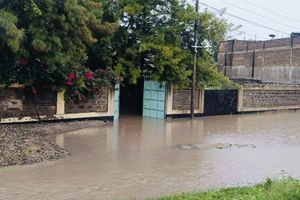Libya rebels gain ground in east as push to unseat Gaddafi intensifies

Photo | AFP
Libyan rebel fighters shout “God is great” as they prepare to leave the oil town of Ras Lanuf to the west front yesterday after up to 10 people were killed and more than 20 wounded in clashes between rebels and loyalists of strongman Muammar Gaddafi.
What you need to know:
- Casualties continue to rise as opposition ‘council’ set to hold its first meeting
Bin Jawad, Libya, Saturday
Libyan rebels said they pushed their campaign closer to Tripoli today by seizing an eastern town, as fighting raged on in a key town west of the capital and casualties rose on both sides.
As the campaign to unseat leader Muammar Gaddafi gathered pace, the recently formed national council — the opposition’s embryonic government — was set to hold its first formal meeting in the eastern rebel stronghold of Benghazi.
A rebel officer who defected when the uprising began last month said “we pushed them past Bin Jawad and today we will pound them back to Sirte,” Gaddafi’s hometown, about 150 kilometres to the west.
An AFP reporter saw groups of rebels in Bin Jawad, a small settlement of two restaurants, shacks and houses.
Libyan planes were circling overhead there and over the nearby oil town of Ras Lanuf, about 40 kilometres east, where rebels clashed heavily with loyalists on Friday.
No-fly zone
One rebel said: “I want to give a message to America. See these planes? We want a no-fly zone,” something Western powers have so far been unwilling to impose.
Asked when the rebels would advance further towards Sirte, a retired soldier turned rebel said it would depend on reinforcements and the weather. A dust storm had drastically reduced visibility in Ras Lanuf on Saturday.
After heavy fighting on Friday, the rebels were in control of Ras Lanuf, a pipeline hub on the Mediterranean coast that houses a major refinery and petrochemical complex.
Hospitals in rebel-held towns to the east said they had received up to 10 dead and more than 20 wounded from Friday’s fierce fighting for the town. Defected soldier Ibrahim al-Atrashi said 16 rebels died in the fighting.
He also said 25 Gaddafi soldiers were killed in fighting on Friday, but the information was impossible to confirm independently.
Meanwhile, the death toll from mysterious twin explosions at an arms dump in the rebel-held east of Libya reached 27.
Among rebels, there were reports of negotiations for a peaceful entry into Sirte, although that would seem unlikely given its symbolism for Gaddafi.
In the west, loyalists rained tank shells and machine gun fire on Zawiyah, 60 kilometres west of Tripoli, as they sought to retake the town centre from rebels, a Sky News correspondent there said.
Late in the afternoon, there were reports tanks manned by Gaddafi’s forces had fired on houses when they launched a fresh assault on the strategic town.
“At least seven people were killed in the offensive launched this morning by two battalions on the city, and there are dozens of wounded,” a doctor in Zawiyah told AFP.
“What happened this morning is horrible. The mercenaries opened fire on anyone who dared go outdoors, even on children,” said the doctor, appealing for help.
The doctor and a city resident stressed that, despite the heavy assault, rebels were still in control of the centre of Zawiyah. Another resident said loyalists had been pushed out of the town.
In Benghazi, headquarters of the rebel forces that control virtually the whole of the east, a spokesman for their self-declared national council said it was poised to hold its first session — in secret for fear of assassination.
“The national council’s first formal meeting is starting this morning,” Mustafa Gheriani told AFP, but did not disclose a time or place.
“It’s a safety issue. This guy (Gaddafi) still assassinates people.”
Appointed chairman
Former justice minister Mustafa Abdel Jalil, one of the first high-profile Libyans to defect from Gaddafi’s four-decade regime when the uprising began, has been appointed chairman of the 30-member body.
Rebels say they have set up local councils in cities they hold across the east and intend their transitional government to lead the country into an election, although Gaddafi is still firmly in control of the capital.
Some rebel figures in Benghazi are keen to open a diplomatic front to their struggle and to demand international recognition and source revenue in order to function.
Rebels want the council recognised as the legitimate government and for all Libyan foreign missions to be recognised as the representatives of their “revolution”.
Gaddafi’s regime is still being boosted by millions of dollars of oil export revenues despite Western sanctions, the Financial Times reported.
The newspaper, citing a senior Western oil official and traders, said payments for exports were finding their way back to Libya’s central bank, and possibly into Gaddafi’s control.
With the protests spreading across the Arab world, threatening strategic US allies like Bahrain and Oman, the Wall Street Journal reported Washington was moving towards a strategy of keeping in power regimes willing to reform.
Citing unnamed officials and diplomats, the newspaper said the administration was leaning toward this approach even if that means the full democratic demands of Arab citizens might have to wait. (AFP)




